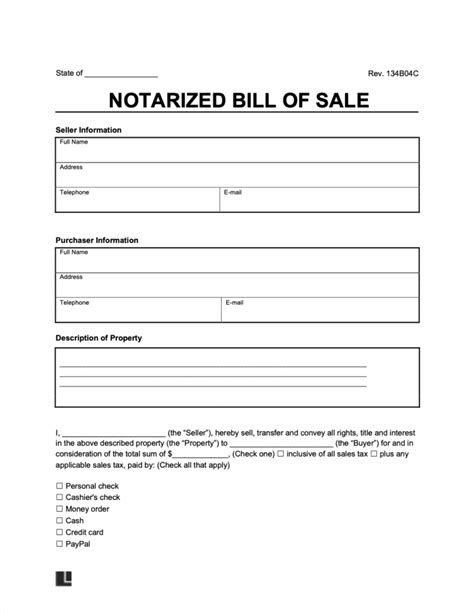Notarize Your Bill of Sale: Get it Done Right the First Time
Selling a car, boat, motorcycle, or even valuable collectibles? A bill of sale is crucial for a smooth transaction and protecting both buyer and seller. But did you know notarizing your bill of sale adds an extra layer of security and legitimacy? This comprehensive guide will walk you through everything you need to know about notarizing your bill of sale, ensuring you get it done correctly from the start.
Why Notarize a Bill of Sale?
While not always legally required, notarizing your bill of sale offers several significant advantages:
- Provides Legal Weight: A notarized bill of sale carries more legal weight than an unsigned document. It serves as stronger evidence of the transaction in case of future disputes.
- Reduces Disputes: A clear, notarized record minimizes the potential for misunderstandings or disagreements between the buyer and seller.
- Protects Against Fraud: Notarization helps prevent fraudulent claims. The notary's verification adds an extra layer of security against someone trying to falsely claim ownership.
- Facilitates Transfers: In some cases, particularly with vehicles, a notarized bill of sale might be required to complete the transfer of ownership with the relevant authorities (DMV, etc.).
What Information Should Be Included in a Bill of Sale?
A comprehensive bill of sale should include the following key details:
- Date of Sale: Clearly state the date the transaction took place.
- Seller Information: Full legal name, address, and contact information of the seller.
- Buyer Information: Full legal name, address, and contact information of the buyer.
- Item Description: A detailed description of the item being sold, including make, model, year, VIN (for vehicles), serial number (for other items), and any other relevant identifying information. Be specific! "2010 Blue Toyota Camry" is better than "a car."
- Purchase Price: State the agreed-upon price in clear numerical and written form.
- Payment Method: Specify how the payment was made (cash, check, bank transfer, etc.).
- Signatures: Both the buyer and seller must sign the bill of sale.
- Notary Seal and Signature: The notary public will affix their seal and signature after verifying the identities of the buyer and seller.
How to Find a Notary Public?
Notaries public are readily available in most communities. You can find one through several avenues:
- Banks and Credit Unions: Many banks and credit unions offer notary services to their customers and the public.
- Law Offices: Law firms often have notaries on staff.
- Post Offices: Some post offices have notaries available, but this varies by location.
- Online Notary Services: Several online services provide remote notarization, allowing for convenience. However, be sure the service is reputable and complies with your state's laws.
What Happens During the Notarization Process?
The notarization process itself is straightforward:
- Identity Verification: The notary will ask for identification from both the buyer and seller (driver's license, passport, etc.).
- Signing the Document: The buyer and seller will sign the bill of sale in the presence of the notary.
- Notary's Seal and Signature: The notary will then affix their official seal and signature to the document, along with the date and their commission expiration date.
What if I Need to Notarize a Bill of Sale After the Fact?
While it's best to notarize your bill of sale immediately after the transaction, it's often still possible to do so later. However, you may need to provide additional evidence of the sale, such as bank statements or witness testimony. Consult with a legal professional if you face this situation.
Is Notarization Always Required?
No, notarization isn't always legally mandated for a bill of sale. However, the added security and legal protection it provides make it highly recommended, especially for high-value items. Always check with your state's laws and relevant authorities for any specific requirements.
What are the legal implications of a non-notarized bill of sale?
A non-notarized bill of sale is still legally binding, but it carries less weight in court. If a dispute arises, proving the validity of the transaction without a notary might be more challenging.
How much does it cost to notarize a bill of sale?
The cost of notarization varies depending on location and the notary's fees. It's typically a small fee, usually under $10.
By following these steps and understanding the importance of notarization, you can ensure your bill of sale is legally sound and provides the best protection for both you and the buyer. Remember, consulting with legal counsel can provide additional guidance specific to your circumstances.

